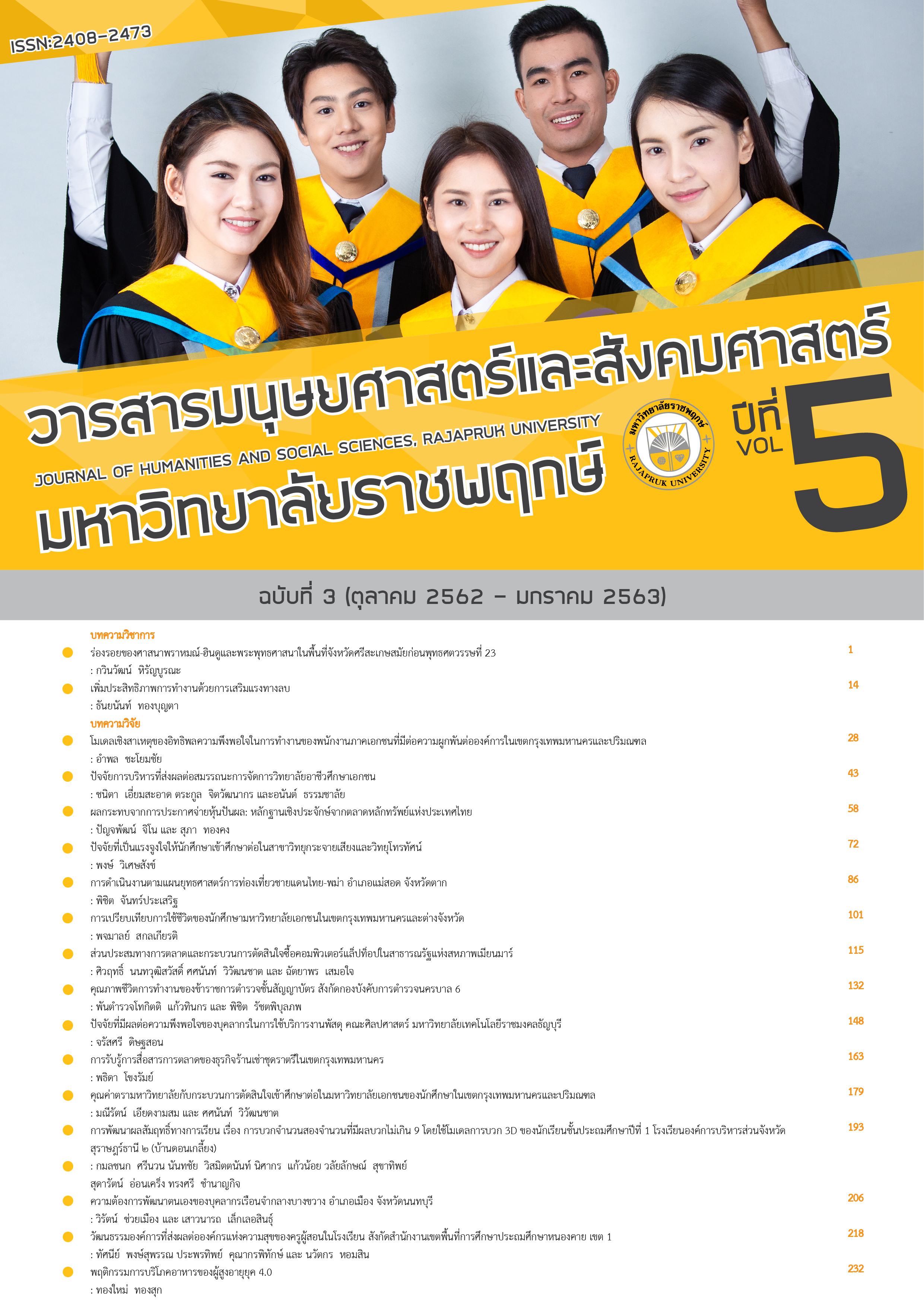The Comparison of Lifestyles of Undergraduate Students in Private Universities in Bangkok and Countryside
Main Article Content
Abstract
The main purpose of this research were to: 1) study factor of lifestyles of undergraduate students at private universities in Bangkok and the countryside in three aspects, and 2) compare campus lifestyles of undergraduate students at private universities in Bangkok and the countryside in three aspects including learning, society, and university activity participation. The randomly selected samples consisted of 366 undergraduate students from 4 private universities enrolling in the academic year 2012. The instrument used for data collection was a five-point rating scale questionnaire on learning, society and university activity participation. The findings revealed that (1) learning behaviors of students from private universities in Bangkok and the countryside were categorized into 7 components including attention, knowledge enhancement, confidence building, discipline, curiosity, lack of interest, and concentration; social behaviors of students from private universities in Bangkok and the countryside were categorized into 6 components including not being themselves, limit themselves, sociability, social culture, friends, and seniority; university activity participation behaviors of students from private universities in Bangkok and the countryside were categorized into 3 components including civic responsibility, narrow-mindedness, and involvement. (2) Three aspects of campus lifestyles of undergraduate students were at a moderate level. (3) Three aspects of campus lifestyles were not significantly different at .05 level.
Article Details
References
ชินภัทร ภูมิรัตน์. (2552).การจัดการความรู้ทางการศึกษา. กรุงเทพฯ: สำนักงานคณะกรรมการการศึกษาแห่งชาติ. ค้นเมื่อวันที่ 17 กรกฎาคม 2554, จาก e-thesis@lib.cmu.ac.th
ชุติมา วัฒนะคีรี. (2561). ความสามารถในการคิดวิเคราะห์ของนิสิตระดับปริญญาตรี มหาวิทยาลัยราชพฤกษ์. วารสารมนุษยศาสตร์และสังคมศาสตร์ มหาวิทยาลัยราชพฤกษ์, 4(1) กุมภาพันธ์ – พฤษภาคม 2561: 101 - 110. ค้นเมื่อวันที่ 15 มิถุนายน 2561, จาก https://www.tci-thaijo.org/index.php/rpu/article/view/125762/95224
พรทิพย์ ศิริภัทราชัย. (2556). STEM Education กับการพัฒนาทักษะในศตวรรษที่ 21. วารสารนักบริหาร, 33(2) เมษายน - มิถุนายน 2556: 49 - 56.
วัลลภา เทพหัสดิน ณ อยุธยา. (2543). การพัฒนาการเรียนการสอนทางการอุดมศึกษา. กรุงเทพฯ:จุฬาลงกรณ์มหาวิทยาลัย.
Cogan, Morris L. (1975). Studies of Teacher Behavior. The Journal of Experimental Education. 26 January 1975: 135 - 139.
Dhephasadin Na Ayudhaya, W. (2000). Instructional Development at Tertiary Level. Bangkok: Chulalongkorn University Press. (in Thai)
Ministry of Education. (1999). National Education Act. B.E. 2542 and amendments. (2nd edition) 2002. Bangkok: Khurusapha Publishing House, Lat Phrao. (in Thai)
Poomirat, C. (2009). Education Knowledge Management. Bangkok: Office of the National Education Commission. Retrieved on 17th July 2011, from e-thesis@lib.cmu.ac.th (in Thai)
Siripatrachai, P. (2013). STEM Education and the Development of 21st Century Skill. Executive Journal, 33(2) April - June, 2013: 49 - 56.
Vatanakhiri, C. (2018). The Analytical Thinking Ability of the Undergraduate Students of Rajapruk University. Journal of Humanities and Social Sciences, Rajapruk University, 4(1) February – May 2018: 101 - 110. Retrieved on 15th June 2018, from https://www.tci-thaijo.org/index.php/rpu/article/view/125762/95224 (in Thai)


